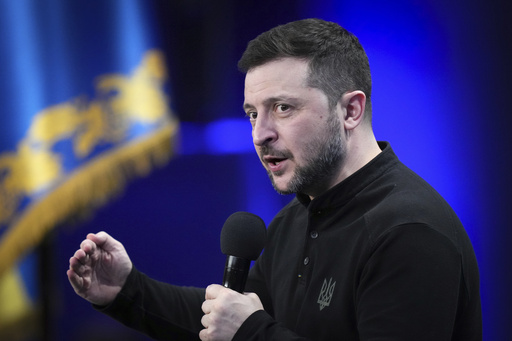KYIV, Ukraine — In a significant turn of events, President Volodymyr Zelenskyy announced on Sunday that the contentious U.S. proposal, which sought to allocate $500 billion from profits of Ukraine’s rare minerals to the United States as compensation for wartime support, has been abandoned. This development indicates potential progress towards an agreement between the two nations.
“Today, as of this evening, the issue of the $500 billion is no longer on the table,” Zelenskyy stated during a news conference at a forum commemorating the third anniversary of Russia’s full-scale invasion. This follows previous pressures exerted by U.S. officials from the Trump administration urging Zelenskyy to consent to a deal that would grant the U.S. access to Ukrainian rare earth minerals as recompense for its military assistance in the ongoing conflict with Russia.
Initially, Zelenskyy rejected a draft agreement regarding these mineral rights, citing the absence of security guarantees and the hefty price tag of $500 billion as major concerns. During his address, he cautioned that framing aid to Ukraine as a debt could create a “Pandora’s box,” compelling Kyiv to reimburse all its allies, leading to undesirable precedents. “We do not acknowledge this debt. It will not be part of the final agreement,” asserted Zelenskyy.
Steve Witkoff, who served as Trump’s special envoy to the Middle East, expressed optimism on CNN’s “State of the Union,” anticipating that a deal could be reached this week, enabling the U.S. to take a more active role in the extraction of critical minerals from Ukraine, such as lithium, which are vital in defense and aerospace sectors.
Treasury Secretary Scott Bessent shared on Fox News that the plan for the minerals aims to establish a U.S.-Ukraine partnership that would benefit both parties, stating, “We profit when the Ukrainian people profit.”
Furthermore, Zelenskyy’s chief of staff, Andrii Yermak, departed the Kyiv forum early alongside Economic Minister Yuliia Svyrydenko to engage in discussions with U.S. officials regarding a potential agreement. Following these discussions, Yermak took to social media to share that he had engaged in “constructive conversations” with U.S. officials, signaling favorable progress in their talks. “We are advancing in our negotiations. The USA is our partner, and we appreciate the support from the American people,” he remarked.
In response to inquiries about whether he would relinquish his presidency for peace, Zelenskyy indicated his willingness to make such a sacrifice if it would lead to a sustainable resolution under NATO’s security framework. “If giving up my post is necessary to achieve peace, I am prepared for that trade-off,” he confirmed.
Zelenskyy’s comments seemed directed towards recent assertions from Trump and Russian President Vladimir Putin that elections in Ukraine should proceed, despite existing laws prohibiting elections during martial law.
The dynamic shift in Trump’s foreign policy, which has included rekindling ties with Russia, has caused concern among Ukrainian and European leaders, raising fears that a hasty resolution might result in territorial losses for Ukraine and increased vulnerability to Russian aggression. Although U.S. officials insist that Zelenskyy will be part of any forthcoming peace talks, Trump’s controversial remarks suggesting that Ukraine instigated the war and labeling Zelenskyy a “dictator” for not holding elections have further strained relations.
Amid these developments, preparations are underway for a meeting between Trump and Putin, indicating a thaw in relations that had previously isolated the Russian leader from U.S. diplomacy.
Moreover, European Commission President Ursula von der Leyen and other top EU officials are expected to arrive in Kyiv for discussions on navigating the changes in U.S. policy. European allies have been working to strategize their support for Ukraine should U.S. aid diminish. Zelenskyy indicated plans to propose a visit to European capitals soon to discuss security assurances with EU leaders.
The U.K. is set to announce new sanctions against Russia, which are described as the most extensive package since the onset of the war, according to Foreign Secretary David Lammy. This new set of sanctions aims at undermining Russia’s military capabilities and cutting off funding for its war efforts in Ukraine.
Additionally, both British Prime Minister Keir Starmer and French President Emmanuel Macron are preparing to visit Washington this week to press for continued U.S. support for Ukraine amid Trump’s pursuit of a peace accord.
Earlier on Sunday, Zelenskyy reported a concerning spike in Russian aggression, noting that 267 drones were launched into Ukraine overnight, marking one of the largest single assaults during the ongoing conflict. Although the Ukrainian air force successfully intercepted 138 of these drones, the attacks resulted in casualties, with one fatality reported in the city of Kryvyi Rih.
In reaction to these aggressive strikes, Andrii Sybiha, Ukraine’s Minister of Foreign Affairs, emphasized that ignoring Russia’s status as an aggressor does not alter its actions, urging vigilance against Putin’s deceptive rhetoric. “Trust should be based on actions, not words,” he stated in a social media message.




